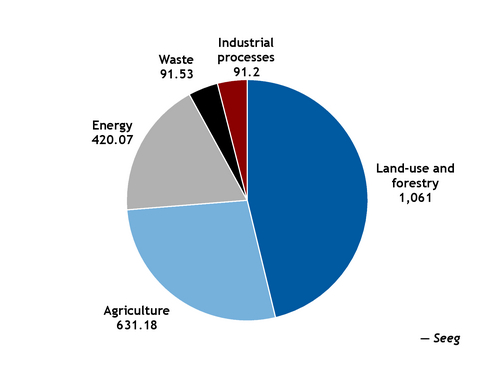Regulations required to put Brazil's regulated carbon emissions market into force have advanced slowly since congress passed legislation in late 2024, but this year may speed several key pieces.
The government plans to gradually implement the market by 2030, even as it prepares to host the Cop 30 climate summit in Belem, Para state in the heart of the Brazilian Amazon in November.
So far this year, the working group responsible for issuing the regulations that will govern the new market has met 20 times. Participants in the working group include representatives from 10 government ministries, but the finance ministry is spearheading regulations. A first round should be ready by July, the ministry said this week.
The working group could define several elements in coming weeks, including clarity regarding the creation of the new agency that will oversee this market. The law stipulates that this new entity have its own technical staff and be independent from the government.
"We urgently need to know who is going to be in charge of this market," Guilherme Lefevre, the director of the Getulio Vargas Foundation's sustainability center said, adding that the market needs to have a strong regulator to have credibility.
For the market to move forward, Brazil also needs to create a national system for monitoring, reporting, and verification of greenhouse gas emissions. "Brazil still does not have this system, which is fundamental for the development of the regulated carbon market," Lefevre said.
This system will underpin the national emissions allocation plan, which will grant companies emission quotas, which can be traded. The law requires companies that emit over 10,000 metric tonnes (t) of CO2 equivalent (tCO2e/yr) to report their emissions and companies with over 25,0000 tCO2e/yr in emissions to participate in the cap-and-trade system that will go into effect when the new carbon market begins operating completely in 2030.
"So far, roughly 600 companies have reported their emissions and a total of around 5,000 companies will need to do so to comply with the market requirements," Laura Albuquerque, chief climate officer at Future Climate consultancy said. She added that that while companies in some sectors, such as steel and pulp and paper are already more prepared for the market, others are behind and are working to understand the extent to which the new market represents a risk or an opportunity.
The government is also in a race against time to show progress towards creating the new market ahead of the November Cop 30 meeting, when it plans to launch an initiative that will integrate the Brazilian carbon market with markets in the EU, China and California. The goal is to use this coalition of carbons markets as a test case for a future, global carbon market.
Not a silver bullet
While the creation of a regulated carbon market is an important element of Brazil's decarbonization efforts, it is only part of the plan to meet its emissions-reduction targets.
Compared with other countries, industry represents a small share of total emissions. In 2023 — the most recent year with available data — non-agricultural industry only accounted for just 4pc of Brazil's total emissions.
Still, because the law permits companies on the regulated market to purchase a share of their credits from the voluntary market, tropical forest protection and restoration projects will also benefit.
With Cop 30 leadership pushing for the next gathering to put into effect what has been agreed at previous summits, Brazil will likely feel pressure to advance more quickly on his own initiatives.



